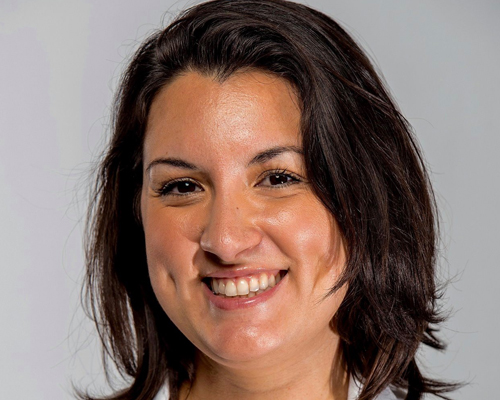Bilingual Rutgers Surgeon Combats Disparities in Breast Cancer Care
Dr. Adriana Suarez-Ligon '09, a surgical oncologist with Rutgers New Jersey Medical School, sheds light on the need to improve access to screenings and treatment for Latinx patients.
 Around 10% of adults in America have limited fluency in English, leading to a myriad of health-related challenges, including skipped medications and negative clinical experiences. And while professional interpreters help, nothing beats having a doctor who speaks your language.
Around 10% of adults in America have limited fluency in English, leading to a myriad of health-related challenges, including skipped medications and negative clinical experiences. And while professional interpreters help, nothing beats having a doctor who speaks your language.
Dr. Adriana Suarez-Ligon does just that, by utilizing her fluency in both English and Spanish as a surgical oncologist and the Director of Breast Surgery at Rutgers New Jersey Medical School (NJMS).
Her parents left Cuba as children, eventually settling in Bergen County, New Jersey.
“I’m the bilingual daughter of immigrants,” Suarez-Ligon said. “My first language was Spanish, because I grew up around my grandparents. Being Cuban-American is a big part of my identity: Cuban food, Cuban music, Cuban everything!”
“I have seen firsthand the impediment language barriers cause in daily life, but especially in medicine. I’m proud to communicate with people in their language of choice, which is Spanish for around 40% of my patients,” she added.
Dr. Suarez-Ligon completed her medical training at NJMS.
“A lot of the physicians here are alums,” Suarez-Ligon said. “We return because we love giving back to, and uplifting this community. They gave us our training. We’re back to give these patients the health care, hope and help they need.”
One way she’s doing that is by collecting data on the disparities Latinx women face when accessing preventative care and treatments. This demographic — along with black women — fail to receive therapy for curable breast cancers more often than Caucasians, and the problem gets more severe as patients age.
“We have an extraordinarily high proportion of Latinx patients in Newark and the surrounding communities we treat. These are very different numbers than the general population,” Suarez-Ligon said. “At NJMS, we’re collecting as much information as we can on minorities, so we can do something significant for these patients. We currently have three years of data; not enough numbers yet for real results. Hopefully, once we have five years of data, we can issue a report on how disparities in care impact our patients.”
In the meantime, Dr. Suarez-Ligon keeps observing stumbling points such as language, reliance on folk remedies and reluctance to intervene (some traditions falsely believe that if you touch the breast, you spread the cancer).
Dr. Suarez-Ligon emphasized that access to adequate insurance coverage continues to be a significant barrier for many of her patients.
“Many of my patients worry about how they are going to pay for surgery. The stress is ridiculous,” she added. “Everyone should have access to health care coverage.”
“I don’t distinguish between those who are insured and charity care patients. I have one set of office hours,” Suarez-Ligon noted. “And for genetic testing, I work with a company that covers costs as long as the patient meets certain criteria.”
“Community outreach is also one of our strengths at NJMS. During Breast Cancer Awareness Month, we offer free screenings at See, Test & Treat on October 12 at the Rutgers Cancer Institute of New Jersey in Newark,” Suarez-Ligon added.
In addition to See Test & Treat, Rutgers New Jersey Medical School and University Hospital continued outreach efforts for the community, by jointly hosting a “Students Health Sciences Day” for students from Newark’s Park Elementary School, and their families, on October 15.
To learn more about what Dr. Suarez-Ligon and fellow faculty at Rutgers New Jersey Medical School are doing to combat disparities in care, click here.

